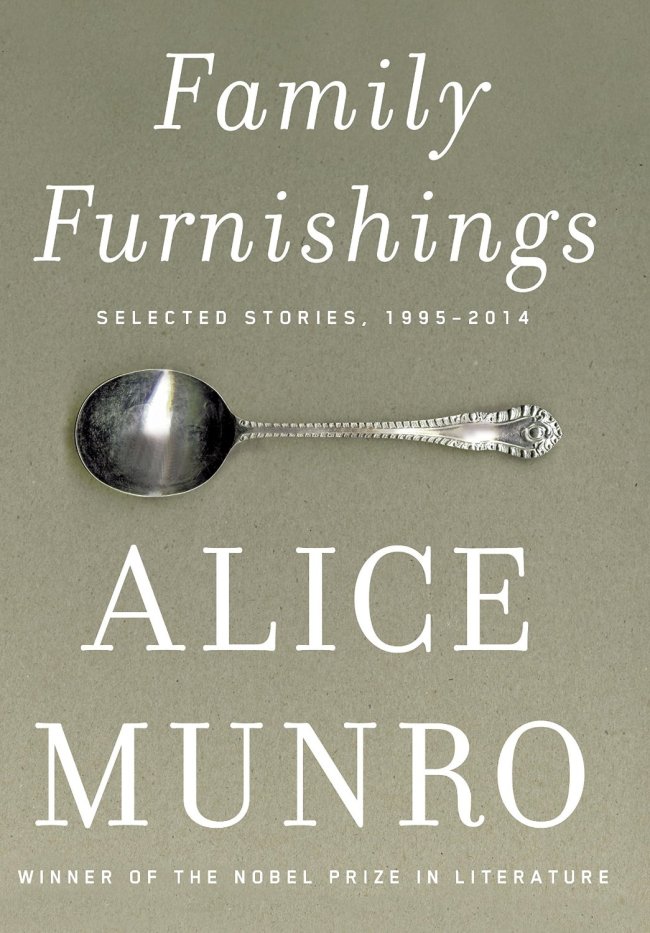The most astonishing aspect of Alice Munro’s “Family Furnishings: Selected Stories, 1995-2014” may be its chronology. The two dozen efforts here come from late in her career, after she had established herself as (perhaps) the preeminent short-fiction writer of her time.
Munro’s first book came out in 1968; she had already received pretty much every award possible before winning the Nobel Prize in literature in 2013. Yet rather than fall into any sort of expected pattern, she has, as Jane Smiley notes in her introduction to this deep and constantly surprising collection, “in the last six volumes, written since 1996 ... gotten more experimental rather than less.”
This is especially true of the “not quite stories” Munro has written over the past decade, pastiches the author calls “autobiographical in feeling, though not, sometimes, entirely so in fact.” Three of them (“Working for a Living,” “Home” and “Dear Life”) appear in “Family Furnishings,” and they bring a certain resonance to the enterprise. Why? Because they remind us that fiction, at its most profound and moving, is about human endurance, which makes it very much a reflection of reality.
We tend to forget that idea sometimes: to see stories, and especially stories written by women, as somehow peripheral, nonessential, when they are, in fact, the only thing we have. This is the primary faith of Munro’s writing, that these lives, these interactions ― often domestic, and only occasionally dramatic in the broadest sense ― matter with the weight of life and death. “She is promising,” Smiley insists, “no drama, no transcendence, only the peculiarity of objects that contain the history of our world and our ancestors, if not ourselves.”
Munro’s first book came out in 1968; she had already received pretty much every award possible before winning the Nobel Prize in literature in 2013. Yet rather than fall into any sort of expected pattern, she has, as Jane Smiley notes in her introduction to this deep and constantly surprising collection, “in the last six volumes, written since 1996 ... gotten more experimental rather than less.”
This is especially true of the “not quite stories” Munro has written over the past decade, pastiches the author calls “autobiographical in feeling, though not, sometimes, entirely so in fact.” Three of them (“Working for a Living,” “Home” and “Dear Life”) appear in “Family Furnishings,” and they bring a certain resonance to the enterprise. Why? Because they remind us that fiction, at its most profound and moving, is about human endurance, which makes it very much a reflection of reality.
We tend to forget that idea sometimes: to see stories, and especially stories written by women, as somehow peripheral, nonessential, when they are, in fact, the only thing we have. This is the primary faith of Munro’s writing, that these lives, these interactions ― often domestic, and only occasionally dramatic in the broadest sense ― matter with the weight of life and death. “She is promising,” Smiley insists, “no drama, no transcendence, only the peculiarity of objects that contain the history of our world and our ancestors, if not ourselves.”

Such a line, between reality and fiction, life and literature, seems especially the province of the short-story writer, who can work by inference in a way novelists cannot. To be sure, that’s the case with Munro, whose narratives turn and tumble, often taking decades to unfurl.
“The Love of a Good Woman,” which opens “Family Furnishings,” begins with a box of optometrist’s tools preserved in a local museum, before recalling the saga of their owner’s death, which peels in layers like an onion until it reveals the inner life of the town itself. “My Mother’s Dream” traces the moment that its first-person protagonist and her mother first came to a necessary accommodation ― a process complicated by this occurring during the narrator’s infancy.

“I believe that it was only at the moment that I decided to come back,” she explains, describing her near-death experience as a baby, “when I gave up my fight against my mother (which must have been a fight for something like her total surrender) and when in fact I chose survival over victory (death would have been victory), that I took on my female nature.”
That’s a stunning revelation, not only for the agency it bestows upon an infant but also for its suggestion that the dynamics that shape us are in place from the outset, that we have less control than we might believe. Choice, then ― or negotiation, which is the great work of adulthood ― resides in what we do with what we are given. As Munro writes in “Post and Beam”: “It was a long time ago that this happened. ... When she was twenty-four years old, and new to bargaining.”
In many ways, this is the driver of Munro’s writing ― to portray people not at the crossroads exactly but for whom life is a series of crossroads or more accurately a narrowing. Her characters are smart and complex, and at times they even test our sympathies; “I knew every bit of this, of course,” the narrator of “Hired Girl” admits, recounting a conversation in which she manipulates her employer into telling the story of her daughter’s death. At the same time, she is ruthlessly self-aware.
“How strange,” this young woman continues, “that I did not question my right to pry, to barge in and bring this to the surface. ... (I)t may have been because I would never quite give up when it came to demanding intimacy, or at least some kind of equality, even with a person I did not like.”
This is an important statement, with its implication that the writer is a kind of leveler, using stories to assert herself. It’s not about gossip, although gossip is a part of it, but more the idea that “in the society I came from, things like that were never buried for good, but ritualistically resurrected, and that such horrors were like a badge people wore ― or, mostly, that women wore ― throughout their lives.”
Her characters, in other words ― like Munro herself ― tell stories not just to mark their passage but also to survive. “I can see myself,” Munro declares in “Home,” one of those autobiographical “not quite stories,” “as a middle-aged daughter who did her duty, stayed at home, thinking that someday her chance would come, until she woke up and knew it wouldn’t. Now she reads all night and doesn’t answer her door, and comes out in a surly trance to spread hay for the sheep.”
That this didn’t happen goes without saying ― but that tension, that willingness to blur the line, is part of the elusive power of these later works. It moves throughout the stories, which often turn in unexpected ways.
In “Dimensions,” a woman lost in grief finds unlikely redemption helping a young man who has been in an accident; her whole existence seems to change in that event. “The Bear Came Over the Mountain” gives us a once-faithless husband who reconnects with his wife after she begins to suffer from dementia: Complex, betrayed and betraying, he is ultimately picked clean by love.
“You could have just driven away,” she tells him. “Just driven away without a care in the world and forsook me. Forsooken me. Forsaken.” There is no false sentimentality here, no illusion, just the understanding that we go on day by day.
Or, as Munro suggests in “Dear Life” (the very title of which embodies such a sense of perseverance, as in “hanging on for dear life”): “We say of some things that they can’t be forgiven, or that we will never forgive ourselves. But we do ― we do it all the time.”
By David L. Ulin
(Los Angeles Times)
(Tribune Content Agency)
-
Articles by Korea Herald









![[Today’s K-pop] BTS pop-up event to come to Seoul](http://res.heraldm.com/phpwas/restmb_idxmake.php?idx=644&simg=/content/image/2024/04/17/20240417050734_0.jpg&u=)
![[Graphic News] More Koreans say they plan long-distance trips this year](http://res.heraldm.com/phpwas/restmb_idxmake.php?idx=644&simg=/content/image/2024/04/17/20240417050828_0.gif&u=)







![[KH Explains] Hyundai's full hybrid edge to pay off amid slow transition to pure EVs](http://res.heraldm.com/phpwas/restmb_idxmake.php?idx=652&simg=/content/image/2024/04/18/20240418050645_0.jpg&u=20240419100350)

